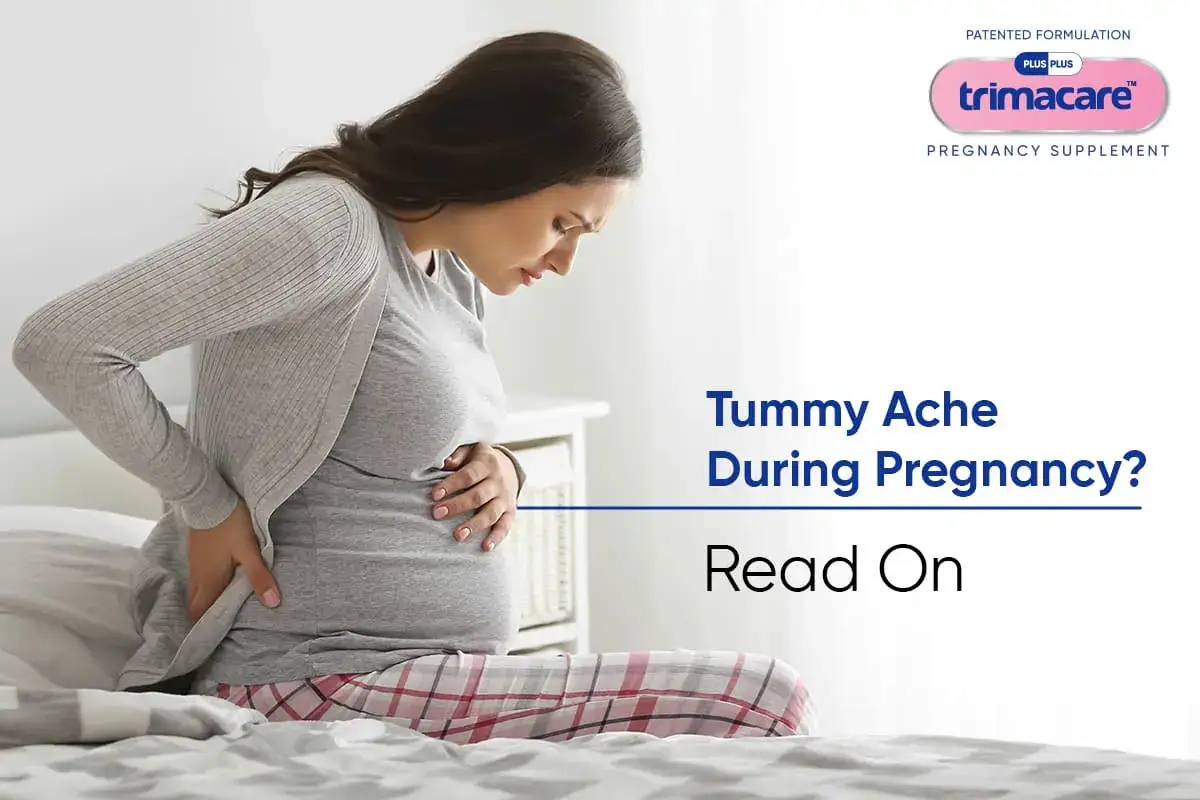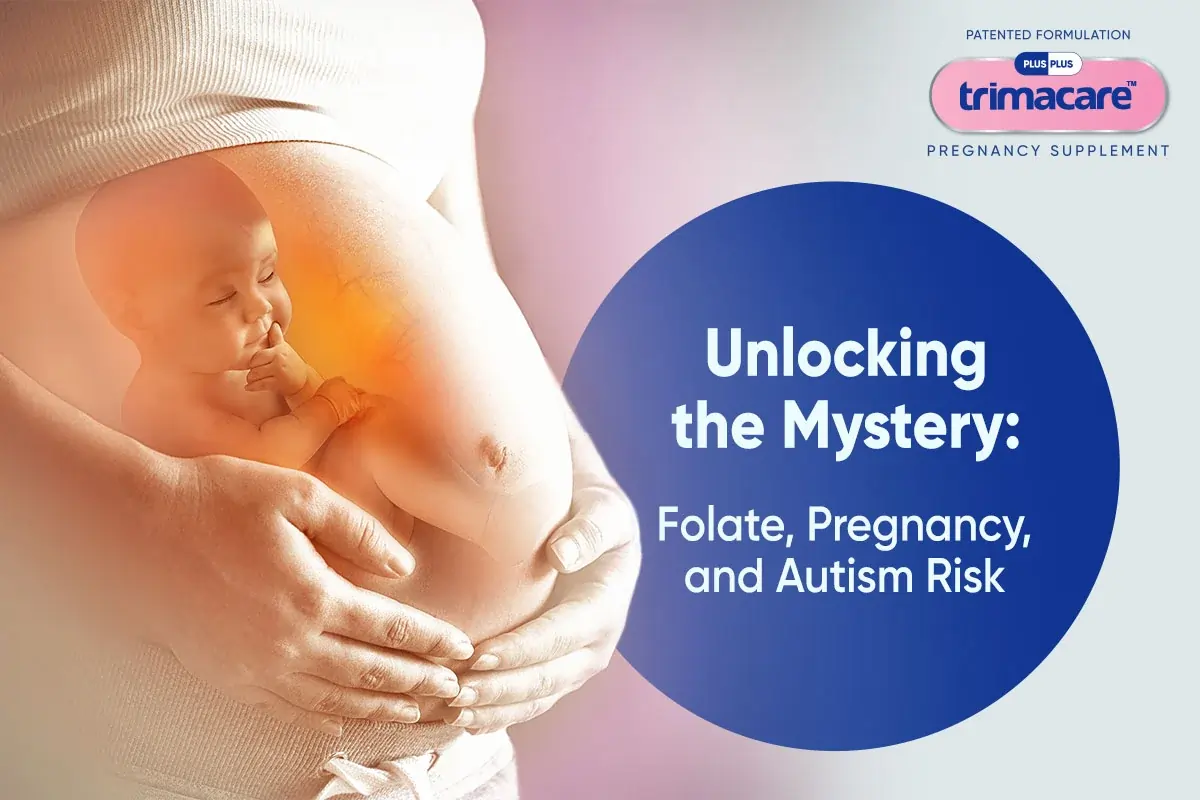Pregnancy is a journey of joy and anticipation, marked by transformative changes in the body. However, it also brings along unique challenges, and one common concern is abdominal pain and cramps. This blog explores the causes of abdominal pain during pregnancy, stomach cramps, and treatment options for pregnant women, highlighting the transformative journey of pregnancy and the need for understanding and treatment for these issues. The article also talks about how Trimacare pregnancy supplement is a supportive measure for reducing cramps during pregnancy journey.
PREGNANCY STOMACH PAIN: A BIG CONCERN
Stomach cramps during pregnancy is a common pregnancy symptom, influenced by hormonal fluctuations and the stretching of round ligaments. It’s crucial for expectant mothers to differentiate between typical discomfort and symptoms requiring medical attention.
CAUSES OF ABDOMINAL PAIN DURING PREGNANCY
Abdominal pain during pregnancy is a common issue, with various causes. Some are normal, while others may require medical attention. Understanding these causes is crucial for expectant mothers.
- Implantation Cramping: During early pregnancy, mild stomach cramps in pregnancy and abdominal discomfort may occur, usually temporary, with light spotting.
- Round Ligament Pain: The uterus’s expanding ligaments can cause sharp pregnancy stomach pain during sudden movements or changes in position, more common in the second trimester, as the growing foetus grows.
- Gas and Bloating: Hormonal changes during pregnancy can impact the digestive system, causing increased gas production and bloating, causing discomfort and abdominal fullness.
- Constipation: Pregnancy hormones can cause constipation and abdominal pain in pregnancy, which can be alleviated by a high-fibre diet and adequate hydration.
- Braxton Hicks Contractions: Practice contractions, also known as Braxton Hicks contractions, are the body’s preparation for labour, causing mild to moderate abdominal discomfort, often felt as tightening or pressure.
- Urinary Tract Infections (UTIs): Pregnant women are at higher risk of developing UTIs due to urinary system changes, causing abdominal pain, pelvic discomfort, and burning sensation, necessitating prompt medical treatment.
- Ectopic Pregnancy: Ectopic pregnancy occurs when an egg implants outside the uterus, causing severe abdominal pain, and is a medical emergency requiring immediate attention.
- Miscarriage: Abdominal pain and vaginal bleeding may indicate a miscarriage, but not all pregnancy pain is indicative, so it’s crucial to seek medical attention.
- Preterm Labor: Abdominal pain accompanied by regular contractions before 37 weeks of pregnancy may indicate preterm labour. This requires immediate medical attention to prevent premature birth and its associated complications.
- Placental Abruption: Placental abruption is a severe medical emergency involving the sudden separation of the placenta from the uterine wall, resulting in abdominal pain, bleeding, and uterine tenderness.
TREATMENT OF PREGNANCY STOMACH PAIN:
- Rest and Relaxation: Round ligament pain and discomfort can be alleviated through proper rest and relaxation, requiring short breaks, and avoiding strenuous activities.
- Hydration and Dietary Changes: To manage gas, constipation, and indigestion, it’s essential to maintain hydration, consume fibre-rich foods, and have smaller, more frequent meals.
- Warm Compress: A warm compress applied to the lower abdomen can alleviate muscle tension and cramping.
- Pelvic Exercises: Doctors recommend gentle pelvic exercises to strengthen muscles and alleviate discomfort.
- Medication (Under Supervision): Doctors may recommend over-the-counter antacids or approved medications for gastrointestinal issues.
THE ROLE OF TRIMACARE IN REDUCING CRAMPS DURING PREGNANCY:
Trimacare, a specially formulated pregnancy supplement, plays a significant role in reducing cramps and promoting overall well-being during pregnancy for Indian women. Trimacare pregnancy vitamins contain several essential nutrients that help in reducing pregnancy cramps. These nutrients are as follows-
- Magnesium for Muscle Relaxation: Magnesium is crucial for muscle function and relaxation. A magnesium deficiency may lead to muscle cramps. Trimacare 1 and 2 pregnancy multivitamins with 206 mg each and Trimacare 3 multivitamin tablet contains 310 mg of magnesium, in the form of magnesium oxide recommended by India’s top gynaecologists, supporting maternal wellbeing by preventing stomach cramps in pregnancy, abdominal pain during pregnancy and preeclampsia.
- Calcium: Calcium intake is crucial for baby’s bone and tooth development and muscle contraction. Indian doctors recommend Trimacare 2 and Trimacare 3 prenatal multivitamins for second and third trimesters, containing 500 mg of calcium, which helps in bone and tooth development, hormone regulation, and nerve cell functioning during pregnancy.
- Vitamin B: Vitamin B6 and Vitamin B12 are essential for nerve function and may help prevent muscle cramps. Trimacare multivitamin tablet contains Vitamin B6 for preventing morning sickness, Vitamin B12 for baby’s neural tube formation, DNA synthesis, red blood cell production, enhanced energy, mood, and reduced stress for mothers.
Abdominal pain during pregnancy is a common issue for Indian women. However, with proper awareness and treatment, it can be managed effectively. Trimacare, pregnancy supplement, can help reduce stomach cramps in pregnancy and promote overall well-being. With the right care, every woman can enjoy pregnancy and its challenges. Indian pregnant women should consult their doctors before incorporating pregnancy supplements into their routine to ensure proper dosage and safety.
Frequently Asked Questions:
1. What are common causes of pregnancy stomach pain?
Common causes of pregnancy stomach pain include ligament stretching, gas, constipation, and round ligament pain.
2. How can I differentiate between normal pregnancy stomach pain and something more serious?
Normal pregnancy stomach pain is often mild and temporary. If you experience severe pain, persistent discomfort, or other concerning symptoms, consult your healthcare provider immediately.
3. Is it normal to experience stomach pain during the first trimester of pregnancy?
Yes, it is common to experience stomach pain during the first trimester as the body adjusts to pregnancy. However, consult your healthcare provider if the pain is severe or accompanied by other worrisome symptoms.
4. What are some home remedies to alleviate pregnancy stomach pain?
Home remedies for relieving pregnancy stomach pain include maintaining proper posture, using a pregnancy pillow, practicing gentle exercises, and consuming small, frequent meals.
5. Can stomach pain during pregnancy indicate a problem with the baby?
While mild stomach pain is often normal, persistent or severe pain may indicate an issue. It is crucial to consult with your healthcare provider to rule out any potential problems and ensure the well-being of both you and the baby.













